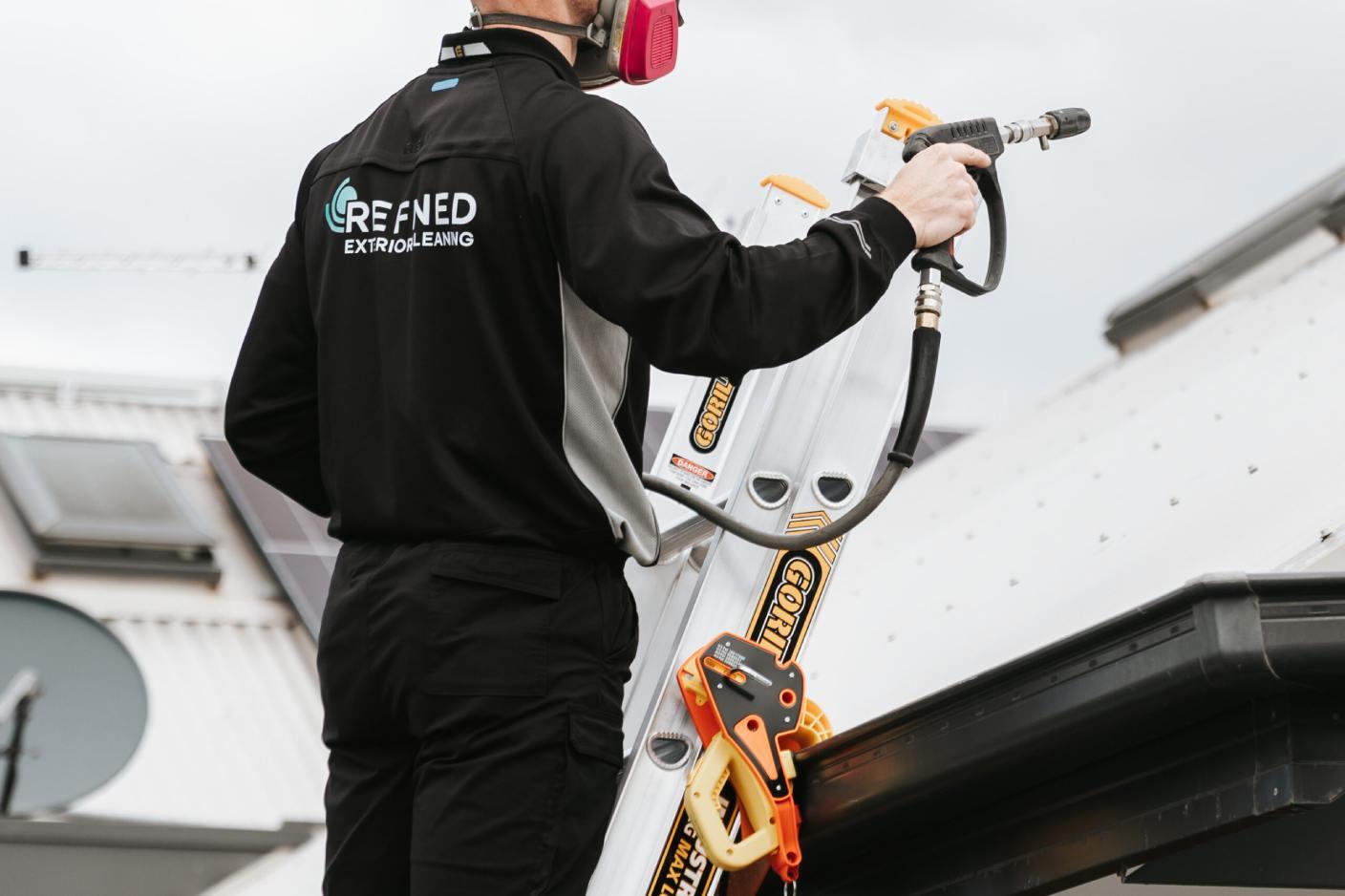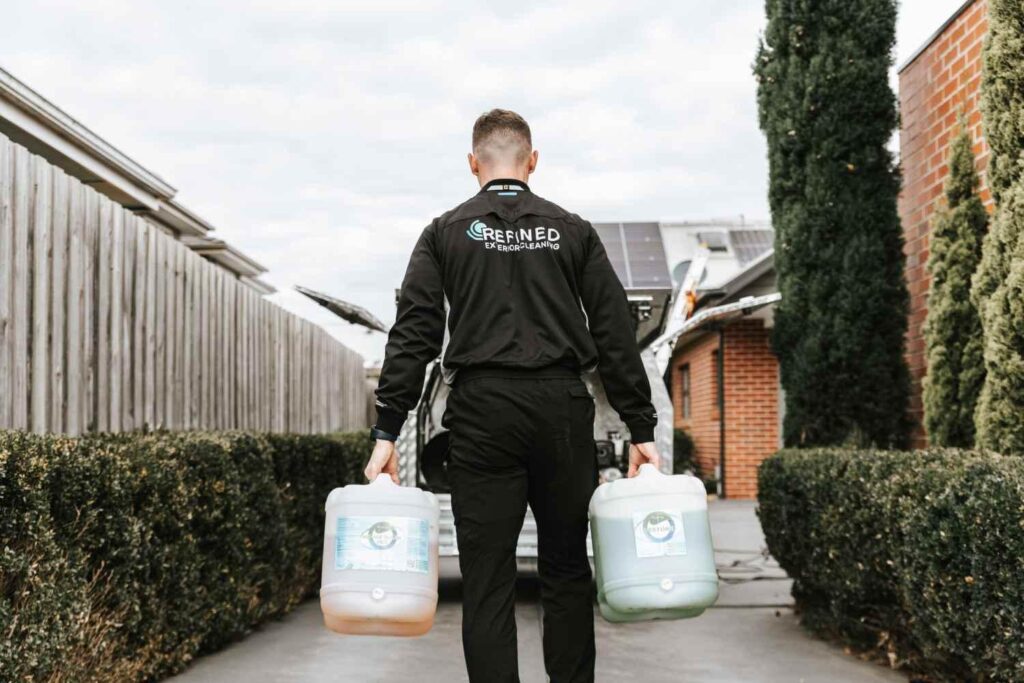A clean driveway doesn’t announce itself, but a filthy one sure does. Grime builds slowly, then all at once: dark patches, slippery moss, streaks that no rain can rinse off.
In cities like Brisbane and Melbourne, it doesn’t take long for weather and wear to coat your surfaces in dirt, pollen, grease, and gunk. Between shaded corners and high-footfall zones, outdoor areas start to age faster than they should.
Pressure cleaning helps you stay ahead of the rot, not catch up after damage has set in. Whether you’re managing a home, a shopfront, or an industrial site, timing makes the difference between light upkeep and costly repair.
This guide breaks down how often to schedule pressure cleaning, based on surface, setting, and season, so you know when to act and what to look out for.
What Affects Cleaning Frequency? (The 3 Big Variables)
There’s no one-size-fits-all answer. The right pressure cleaning schedule depends on three core factors:
Surface Type
Some materials hold grime like a bad habit. Timber soaks in moisture and stains. Rendered walls trap dust. Concrete shows oil like it’s wearing a spotlight. Different surfaces demand different cleaning intervals and cleaning techniques.
Exposure
Sunlight keeps some areas dry. Others sit under trees, near gutters, or in the splash zone of traffic and weather. Shaded and damp areas attract algae faster. Surfaces near vegetation pick up stains, spores, and organic buildup more often.
Usage
High-use zones get dirty faster, plain and simple. Think shopfronts, driveways, car parks, and patios. If people walk or drive on it daily, that surface is clocking mileage. And mileage means maintenance.
Understanding these three factors sets the stage for smarter decisions and helps avoid both under-cleaning and overdoing it.
How Often to Clean: Real-World Recommendations
Pressure cleaning schedules only make sense when they reflect how a space is used and what it’s made of. Here’s the breakdown.
Homes
- Exterior walls: Timber, painted, or rendered surfaces tend to collect dirt, cobwebs, and moisture marks. In most cases, a 6–12 month interval keeps things fresh.
- Driveways & paths: These wear grime like a badge of honour, oil spots, tyre marks, and mould. An annual clean is the minimum; more often if the surface feels slippery.
- Decks & patios: If your deck lives under trees or hosts weekend barbecues, it’ll show signs faster. Plan for a clean every 6–10 months, especially after pollen-heavy seasons or stormy weather.
- Gutters: Technically not pressure cleaning, but worth noting that if you’re cleaning the rest, include gutters twice a year to avoid blockages and overflow damage.
Watch for: green film, dark streaks, patches that stay damp, or uneven colour.
Businesses
- Shopfronts: First impressions hit fast. Dusty signage, stained pavement, or sticky doorways chase customers away. Most shops benefit from a clean every 3–6 months, depending on foot traffic and pollution levels.
- Hospitality venues: Spills, footfall, and outdoor seating demand more. Sidewalks and entries should be cleaned quarterly, at the very least, and sometimes even monthly during peak seasons.
- Office buildings: While less exposed than retail, exterior facades and walkways still need regular care. Twice a year keeps things sharp without disrupting operations.
We often help schedule these cleans during off-hours, so business doesn’t skip a beat while surfaces get sorted.
Industrial & Public Zones
- Car parks, loading bays, and public walkways they take a pounding. Between oil leaks, forklift dust, and foot traffic, grime builds fast and hard.
- Expect cleaning every 2–3 months to maintain safety and visibility.
- Surfaces here often require higher pressure or degreasing agents, another reason to get the timing right before build-up needs more elbow grease (and budget) to fix.
Seasonal Timing: Clean With the Weather, Not Against It
Melbourne and Brisbane don’t mess around with the weather. One minute it’s a heatwave, next it’s hosing down sideways. The key? Clean surfaces at the right time to avoid wasting water, money, or effort.
Spring & Early Summer
Best time to refresh:
- Gets rid of winter muck and mould
- Preps outdoor areas for events, gatherings, or open homes
- Ideal for decks, paving, facades, and entertaining zones
BBQ season looks better when your patio doesn’t resemble a petri dish.
Autumn
This one’s about prevention. Leaves, dirt, and moisture build up fast and turn surfaces slick, stained, and dangerous. Clean:
- Before wet weather sets in
- After heavy leaf-fall
- Around gutters, driveways, and shaded walls
A good Autumn clean saves you from pressure washing during winter chills or from slipping on soaked moss in July.
Winter
Pressure cleaning slows down during winter, but doesn’t stop. When weather allows:
- Clear algae off paths and entries to prevent slips
- Flush blockages in walkways and stormwater channels
- Use soft washing or selective cleaning where needed
If surfaces are dry and above freezing, don’t wait till spring. Spot-clean where needed to keep things safe and prevent permanent damage.
Warning Signs You’re Overdue
Grime doesn’t knock politely, it creeps in quietly, then hits all at once. If your property’s starting to look tired, odds are you’ve missed the sweet spot for maintenance.
Here’s what to watch for:
- Green patches on concrete, brick, or render
- Slippery surfaces, especially after rain
- Black streaks along gutters or down walls
- Pooled water where there shouldn’t be any
- Musty smell near shaded paths or decks
- Faded paint or uneven surface colour
If you’re spotting more than one of these? You’re already late. Clean now or pay more later.
Surfaces that stay dirty for too long don’t just look rough. They start to break down: timber rots, concrete weakens, and sealed finishes lose their protection. That turns a basic clean into a full repair job, or worse, replacement.

DIY or Pro? (And How Often to Call In Help)
Grabbing a pressure washer from Bunnings might sound like a solid weekend job, but one wrong move and you’ll carve a hole through your paintwork, deck, or even your sanity.
When DIY Works:
- Light dirt on sealed driveways or paths
- You know the right PSI and nozzle for the job
- You’re cleaning small areas, not full exteriors
But let’s be real, most DIY jobs leave behind streaks, missed spots, or surface damage that takes longer (and more money) to fix.
When It’s Time to Call Us:
- Delicate surfaces like timber, render, and painted exteriors
- Large areas (house washing, facades, multiple paths)
- Commercial and public-facing spaces where quality shows
- High buildup of algae, mould, oil, or graffiti
- You need it done fast, right, and with no muck-around
At Refined Exterior Cleaning, we handle every job with surface-matched tools and pro-grade techniques, including soft washing when pressure could harm. And we don’t oversell. We create cleaning plans that match your property’s actual wear, not just the calendar.
Want to clean smart, not often? One solid service can save you from months of staring at dirt you can’t shift.
Keep the Clean Going, Not Just Catching Up
The longer grime stays, the harder it is to shift and the more damage it leaves behind. Pressure cleaning isn’t just about making things look sharp. It’s how you prevent surface wear from escalating into costly repairs.
Whether it’s your home, your business, or your building’s shared spaces, keeping to a cleaning schedule that suits your property’s materials and exposure is what really keeps things in shape.
At Refined Exterior Cleaning, we help clients across Brisbane and Melbourne stay ahead of the grime with pressure cleaning plans that suit your property, not just a calendar.
Book your next clean with us, and we’ll handle the mess before it becomes a problem.
Frequently Asked Questions
Can pressure cleaning remove long-standing oil stains from concrete?
Yes, but it depends on how deeply the oil has soaked in. We use degreasers and high-pressure surface cleaners designed for heavy build-up. For older stains, full removal might take more than one round, but we always assess and set clear expectations up front.
Is pressure cleaning safe during water restrictions?
In most cases, yes. We use equipment that minimises water waste and complies with local council regulations. For properties in strict-restriction zones, we adjust our method to reduce water use while still delivering solid results.
Can you pressure clean multi-storey buildings?
Absolutely, we’re equipped for double-storey homes, apartment facades, and light commercial buildings. We use long-reach tools and safety-rated gear to get the job done without scaffolding in most cases. Just tell us what you need, and we’ll sort out the safest method.


